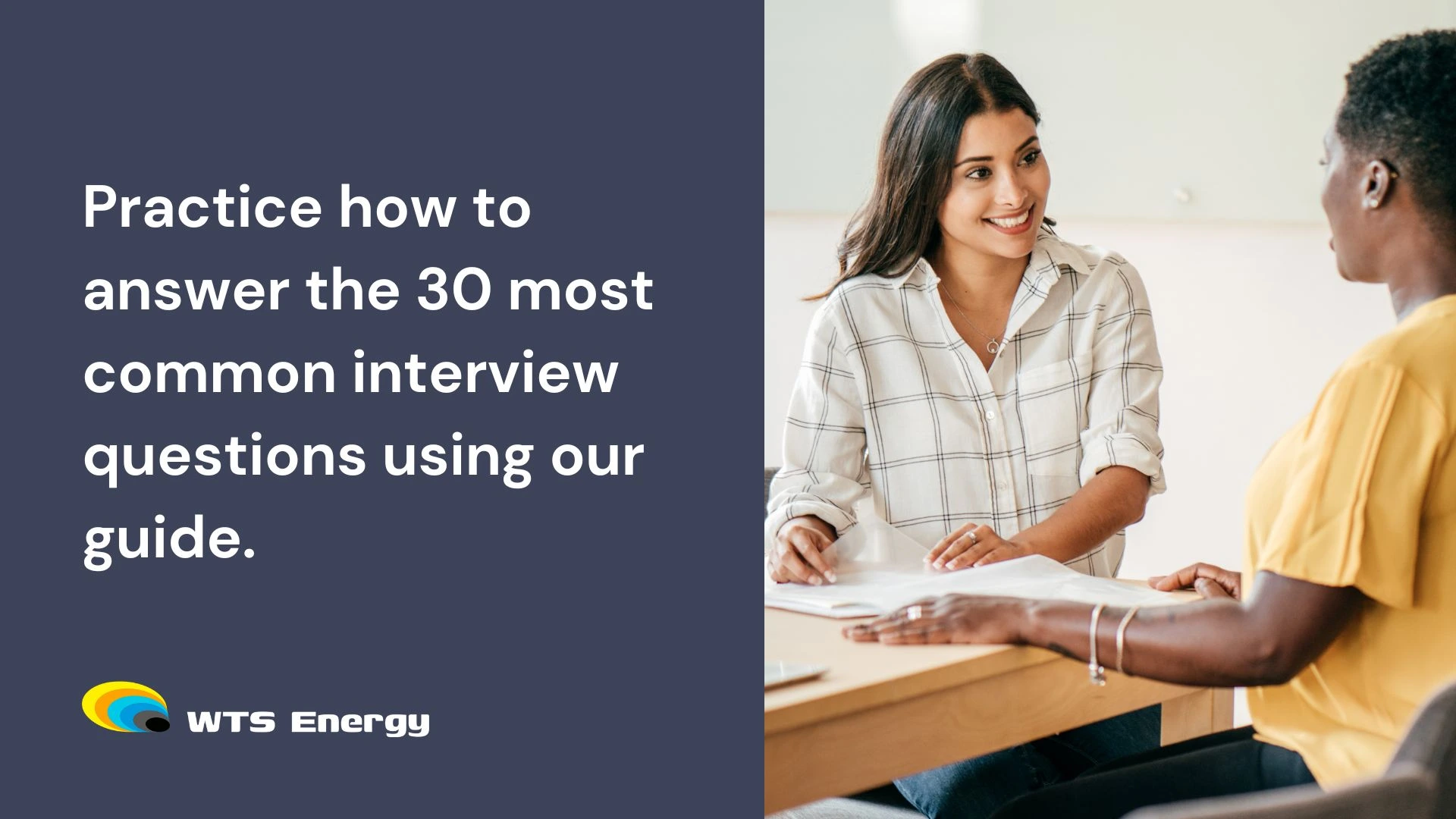Estimated reading time: 13 minutes
Navigating job interviews can be daunting, but preparation can make all the difference. Being ready to answer common interview questions not only boosts your confidence but also sets you apart from other candidates. In this article, we break down the 30 most common interview questions into categories and offer helpful tips for crafting compelling responses. For each question, try to practice answering it on your own before checking our sample answer.

General interview questions and answers
General interview questions may seem straightforward, but they set the tone for the rest of the conversation. These questions are designed to uncover your personality, communication skills, and alignment with the company’s values. Crafting thoughtful and structured answers can leave a lasting impression and position you as the right fit for the role. Let’s break down some of the most common questions and how to answer them effectively.
1. Tell me about yourself.
Focus on your professional background, key achievements, and what makes you a good fit for the role. Keep your answer concise, structured, and relevant to the job. A good format to follow is past (your experience), present (current role), and future (what you’re looking for).
Check answer
“I’m a Renewable Energy Engineer with three years of experience working on solar and wind energy projects. At XYZ Solutions, I optimized solar panel efficiency by 12% and managed a team of four engineers. I’m passionate about advancing renewable technologies to meet global energy demands sustainably.”
2. Why do you want to work here?
This question evaluates how well you understand the company and align with its values. Show that you’ve done your homework by highlighting specific aspects of their mission, projects, or culture that resonate with your professional aspirations. Clearly link your skills and experience to their goals, explaining how you can add value and help drive their success.
Check answer
“I admire your company’s commitment to innovation in clean energy, particularly the recent launch of your new wind energy projects. I believe these initiatives align well with my goals and I would like to contribute my expertise in system optimization to help expand these projects.”
3. What are your career goals?
Be honest but flexible. Highlight goals that align with the company’s direction. Show a mix of ambition and realism by sharing both short- and long-term objectives that the job can help you achieve.
Check answer
“Short-term, I want to deepen my expertise in renewable energy project management, taking on increasingly complex projects. Long term, I see myself stepping into a leadership role where I can mentor a team and contribute to large-scale initiatives that drive global sustainability.”
4. What motivates you in your work?
Discuss what drives your passion and productivity. Tailor your answer to reflect aspects of the job. Think about factors such as innovation, collaboration, or making an impact; what genuinely excites you?
Check answer
“I’m motivated by working on projects that have a real-world impact, like improving energy efficiency or implementing renewable solutions. Knowing that my work helps reduce carbon emissions and contributes to a sustainable future keeps me excited about what I do.”
5. Why are you leaving your current job?
Stay positive and forward-looking. Focus on what you’re seeking in your next role, such as growth, new challenges, or alignment with your values, rather than criticizing your current or previous employer.
Check answer
“I’m looking for opportunities to work on more diverse renewable energy projects and take on greater leadership responsibilities.”
6. Where do you see yourself in five years?
This question is an opportunity to show ambition while aligning your goals with the company’s vision. Be realistic and specific about your career aspirations, focusing on growth within the industry or company. Avoid overly ambitious answers that might seem disconnected or unrealistic, but don’t be too vague either.
Check answer
“In five years, I see myself taking on a leadership role where I can manage renewable energy projects from start to finish. I aim to deepen my expertise in sustainable energy technologies and contribute to impactful projects that drive innovation and reduce emissions. Ideally, I’d like to grow within this company, leveraging its focus on clean energy solutions.”
7. Describe your ideal company culture.
Here is your chance to describe the work environment where you thrive. Be honest but frame your preferences positively, showing flexibility. Mention aspects like collaboration, innovation, or diversity. Think about what kind of company you want to work for.
Check answer
“My ideal company culture is one where collaboration feels natural, ideas are encouraged, and everyone’s voice is heard. I work best in an environment where people value teamwork and innovation but also know how to laugh during a busy day.”
8. What is your expected salary?
When discussing salary expectations, aim to strike a balance between being honest and flexible. Research the market rate for the position to provide a realistic range. Avoid stating a fixed number initially and instead express your willingness to negotiate based on the role’s responsibilities and benefits.
Check answer
“I’m looking for a competitive salary that reflects the market value for this role and my experience. Based on my research and the responsibilities outlined, a range of €65,000 to €75,000 seems reasonable, but I’m open to discussing what works best for both of us. What is your budget for this position?“
Behavioral interview questions
Behavioral interview questions are designed to assess how you’ve handled situations in the past to predict your future behavior in similar scenarios.
How to Tackle Behavioral Questions
The STAR method is a proven framework for answering behavioral questions effectively. It ensures your response is clear, focused, and highlights your abilities. Here’s what STAR stands for:
Situation
Briefly describe the context or background of the situation.
Task
Explain the specific challenge or responsibility you faced.
Action
Detail the steps you took to address the task.
Result
Share the outcome and what you achieved.
9. Tell me about a time you faced a challenging deadline.
Choose an example that showcases your problem-solving abilities and how your actions positively impacted the outcome.
Check answer
“In my previous role as a project coordinator, I was tasked with overseeing a client proposal that had to be submitted in just three days, instead of the usual week. My responsibility was to ensure all teams, design, content, and strategy, worked together efficiently to meet the tight deadline. I quickly organized a meeting to delegate tasks, set hourly check-ins to track progress, and stepped in to help edit the content to save time. We submitted the proposal on time, and the client was impressed with our work, securing a contract worth $500,000.”
10. Have you ever faced a conflict at work? How did you handle it?
Focus on professionalism. Describe the conflict objectively, your efforts to resolve it constructively, and what you learned from the experience.
Check Answer
“During a solar installation project, two team members had conflicting opinions on the layout design. I set up a quick meeting where we could openly discuss the pros and cons of each approach. By focusing on the project’s goals and encouraging collaboration, we combined elements of both ideas into a solution that everyone supported. It not only resolved the conflict but also kept the project on schedule.”
11. Describe a time when you had to meet a tight deadline.
Here’s your chance to show how you manage stress and prioritize tasks. Explain how you organized your work and ensured quality under pressure, emphasizing your efficiency and reliability.
Check answer
“While working on a solar panel installation project, we faced an unexpected delay in receiving materials, which left us with just three days to complete the installation before the client’s inspection. I organized the team, streamlined tasks, and coordinated overtime shifts to ensure we stayed on track. Despite the pressure, we met the deadline and maintained the quality standards expected by the client.”
12. Tell me about a time you dealt with a difficult client.
Choose an example that shows your professionalism and problem-solving skills. Explain how you understood the client’s concerns, communicated effectively, and resolved the issue while maintaining a positive relationship.
Check answer
“A client requested last-minute design changes. I presented a revised timeline and cost implications, ensuring transparency. They appreciated the clarity and approved of the changes.”
13. Tell me about a project you’re particularly proud of.
Choose a project that highlights your skills and impact. Use the STAR method to explain your role, actions, and the successful results you achieved.
Check answer
“During my time at XYZ Solutions, I led a team to design a solar power system for a rural community. By optimizing panel placement and storage, we increased energy efficiency by 15%, providing reliable electricity to over 100 households for the first time. It was incredibly rewarding to see our work make such a tangible impact.”
Situational interview questions
Situational interview questions are designed to assess how you would handle hypothetical scenarios, providing insight into your decision-making, problem-solving, and critical thinking skills.
14. How would you handle an underperforming team member?
Show leadership and communication skills. Discuss how you would identify the issue, offer support, and work collaboratively to improve their contribution.
Check answer
“I’d have a one-on-one conversation to identify challenges, provide guidance, and create a performance improvement plan with clear milestones.”
15. How would you handle a situation where you disagreed with your manager?
Focus on diplomacy and problem-solving. Explain how you would approach the discussion respectfully, present your perspective, and work towards a constructive solution.
Check answer
“I would calmly present my perspective, backed with facts or data, and ask for their input. My goal would be to reach a solution that aligns with the team’s objectives while respecting their decision.”
16. How would you approach a task you’ve never done before?
Show your initiative and resourcefulness. Discuss how you would research, seek guidance, and break the task into manageable steps to ensure success.
Check answer
“I’d start by researching best practices, consult experienced colleagues for guidance, and break the task into smaller steps to ensure I could complete it effectively and accurately.”
17. What would you do if you discovered a mistake after submitting your work?
Highlight accountability. Explain how you would address the issue immediately, inform the relevant parties, and take steps to rectify the mistake.
Check answer
“I’d immediately inform my manager, explain the situation, and provide a clear plan to fix the error. My focus would be on resolving the issue quickly and learning from it.”
18. How would you manage multiple projects with competing deadlines?
Hiring managers are looking to see if you can think on your feet. Talk about your prioritization strategies, time management tools, and ability to communicate effectively to meet deadlines without compromising quality.
Check answer
“I’d prioritize tasks based on deadlines and impact, use a project management tool to stay organized, and communicate regularly with stakeholders to manage expectations effectively.”
Questions about strengths and weaknesses
When discussing your strengths, think of qualities that genuinely align with the role. This isn’t the time to talk about your karaoke skills (unless the job requires it). Instead, back up your strengths with real examples that show how you’ve applied them. For weaknesses, pick something real but not deal-breaking, and add a touch of how you’re working on it, like finally learning to embrace that project management software instead of sticking to post-it notes. This shows self-awareness and growth.
19. What is your greatest strength?
Check answer
“My ability to adapt quickly to new challenges. For instance, I swiftly adopted a new solar panel technology mid-project, training the team and ensuring successful implementation.”
20. What is your greatest weakness?
Check answer
“I sometimes focus too much on details, but I’ve started using project management tools to balance detail orientation with big-picture goals.”
21. How do you handle constructive criticism?
Check answer
“I view it as an opportunity to grow. Feedback on my project timelines, for example, led me to improve time estimates and exceed expectations in the next project.”
Technical interview questions
Technical interview questions evaluate your industry-specific knowledge and problem-solving abilities. These questions often involve practical scenarios, technical concepts, or even on-the-spot problem-solving. Think of it as a pop quiz for grown-ups, except instead of algebra, you’re troubleshooting wind turbine efficiency. In renewable energy, for instance, you might find yourself sketching out an ideal solar panel layout or analyzing energy yield simulations.
To prepare:
Research the Role
Understand the technical requirements listed in the job description and refresh your knowledge in those areas.
Review Core Concepts
Revisit fundamental theories, tools, or software relevant to your field.
Practice Problem-Solving
Engage in mock tests or scenarios to build confidence in tackling real-world problems.
22. How would you design an efficient solar panel layout for a small commercial building?
Check answer
“I’d analyze the roof’s orientation, size, and shading. I’d prioritize a south-facing design with minimal shading to maximize sunlight exposure and efficiency. Using simulation software like PVsyst, I’d model the layout to optimize energy yield and meet the client’s needs.”
23. Explain your experience with renewable energy software tools.
Check answer
“I’ve worked with PVsyst for solar analysis and SCADA systems for wind farm monitoring to optimize performance.”
24. How would you approach optimizing the energy output of a wind farm?
Check answer
“I’d analyze wind patterns, turbine placement, and maintenance schedules. Using tools like WindSim, I’d simulate different configurations to maximize output while minimizing wear and operational costs.”
25. What steps would you take to troubleshoot a photovoltaic system not operating at full capacity?
Check answer
“I’d first check for physical obstructions like dirt or shading on panels. Next, I’d inspect connections and wiring for faults, then review the inverter and monitoring system for irregularities. Lastly, I’d analyze performance data to identify any unexpected inefficiencies.”
Questions to ask the employer
Asking insightful questions during an interview not only shows genuine interest in the role but also positions you as a proactive and thoughtful candidate. It’s an opportunity to evaluate if the organization aligns with your values and career aspirations while leaving a positive impression on the interviewer. Here are some questions you should ask your potential employer and why they’re great.
26. What does success look like in this role?
It shows you’re focused on contributing effectively and want to align with their expectations.
27. How would you describe the company culture?
You’ll get insights into the workplace dynamics and whether it’s a good fit for your working style.
28. What are the team’s biggest challenges right now, and how can this role help?
It demonstrates your problem-solving mindset and eagerness to make an impact.
29. What opportunities for professional growth and development does the company offer?
It signals your ambition to grow within the organization and shows that you’re in it for the long haul.
30. Can you share more about the team I’ll be working with?
This helps you understand your future colleagues. These are, after all, the people you will most likely be working with for a long time period.
Follow us on LinkedIn
See our latest opportunities in the energy sector
Resources for practicing interview questions
Preparation is key to mastering interview questions, and there are numerous tools and methods to help you refine your responses and boost your confidence. Some tools include Google’s Interview Warmup (no account needed) and Code Academy’s Interview Simulator (free account needed). You can also practice with a friend and ask them to provide feedback on your answers.
Preparing for an interview may feel overwhelming, but it doesn’t have to be. With these common questions, strategic answers, and practical tips, you’ll be well-equipped to make a lasting impression at your next interview.

Find your next job with us today.
We are currently recruiting for various positions in the energy, maritime and construction industries around the world. Do not miss the chance of turning your career around.



